"[...] although people disapprove of #flaming, and research demonstrates how resorting to nastiness and incivility weakens third-party assessments of persuasive signals [...], people appear to still believe in its effectiveness. Consistent with the #thirdpersoneffect [...], people appear to assume that other people are persuaded by flaming, just not themselves. This contributes to our understanding of why [...] people still commonly engage in such behaviors."
https://academic.oup.com/jcmc/article/29/2/zmae001/7618999#442678482

